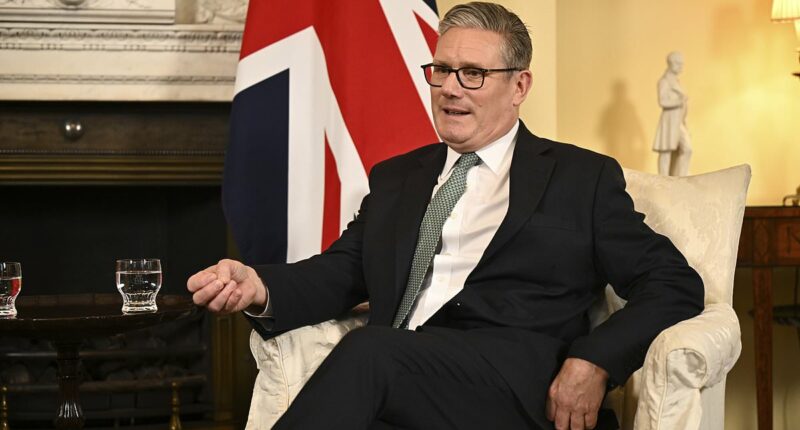Share this @internewscast.com
Labour could bolster its support by as much as half a million votes at the next election after confirming it plans to let 16 and 17-year-olds take part for the first time.
Sir Keir Starmer today unveiled plans to ‘modernise our democracy’ by widening the franchise to bring national elections in line with those held in Scotland and Wales.
But the move, a manifesto pledge from the party, has been criticised as a cynical ploy since a large proportion of young voters support Labour.
A poll last night suggested that 33 per cent of those enfranchised by the change would back Sir Keir’s struggling party, with Reform second on 20 per cent and the Tories on just 10 per cent.
With official statistics showing there will be around 1.5million people in that age bracket by the time of the next election, it could add up to 500,000 votes.
MailOnline’s own analysis of the 2024 election result suggests Labour could have won up to nine extra seats if 16 and 17-year-olds had been allowed to vote.
Sir Keir today told ITV News: ‘I think it’s really important that 16 and 17-year-olds have the vote, because they are old enough to go out to work, they are old enough to pay taxes, so pay in.
‘And I think if you pay in, you should have the opportunity to say what you want your money spent on, which way the Government should go.’
But Conservative shadow communities minister Paul Holmes said: ‘This is a brazen attempt by the Labour Party, whose unpopularity is scaring them into making major constitutional changes without consultation and it shows with their inconsistent approach to what a young person can or can’t do.’

Sir Keir Starmer told ITV News: ‘I think it’s really important that 16- and 17-year-olds have the vote, because they are old enough to go out to work, they are old enough to pay taxes, so pay in’

The move, a manifesto pledge from the party, has been criticised as a cynical ploy since a large proportion of young voters support Labour
Speaking in the Commons he added: ‘Why does this Government think a 16-year-old can vote but not be allowed to buy a lottery ticket, an alcoholic drink, marry, or go to war, or even stand in the elections they’re voting in?’
Using Government statistics, MailOnline calculated how many teens within that age bracket lived in each of England’s 543 constituencies.
Turn-out figures from the 2024 election were used to estimate the proportion of 16 and 17-year-olds who might vote, based on voting intention polls collated by Merlin Strategy.
Under that scenario, Labour would have secured an extra 260,000 votes and nine seats – taking six from the Tories and one from Reform. Two of Jeremy Corbyn’s Independent MPs would have been stopped from getting in, too.
The reality of the situation for the upcoming Election would be much different, with Labour having lost ground to Reform in scores of key battlegrounds.
In a blow to the Government, it has also emerged that almost half of teenagers do not even want to be given the vote.
In the Merlin poll, some 49 per cent of those questioned said they disagreed with the move. Only a few more of the 500 youths questioned, 51 per cent, backed Labour’s proposal.
In addition, only 18 per cent of the 16 and 17-year-olds polled said they would definitely cast a ballot if there was an election tomorrow – with 13 per cent saying they would not take part.
Ministers are also proposing to introduce automated voter registration, which is already used in Australia and Canada, and making UK-issued bank cards an accepted form of ID at polling stations.
The Ministry of Housing, Communities and Local Government said ‘far too many people’ had been put off voting by the voter ID rules introduced by the previous government, with the Electoral Commission finding around 750,000 people did not vote due to a lack of ID.
The Government has already made the Veteran Card an accepted form of voter ID, and intends to allow digital forms of ID to be used when they become available.
Deputy Prime Minister Angela Rayner said: ‘For too long public trust in our democracy has been damaged and faith in our institutions has been allowed to decline.
‘We are taking action to break down barriers to participation that will ensure more people have the opportunity to engage in UK democracy, supporting our plan for change, and delivering on our manifesto commitment to give 16-year-olds the right to vote.’

Conservative shadow communities minister Paul Holmes accused the Government of being ‘hopelessly confused’ about the age of majority
Currently only those who are over 18 can take part in general elections, although 16 and 17-year-olds are allowed to vote for the devolved Scottish and Welsh parliaments.
It is estimated another 1.5 million teenagers will be enfranchised for the next election – though Labour has dropped controversial plans to give millions of EU nationals the vote.
A survey of young people – commissioned by ITV News – found 33 per cent of teenagers would vote Labour. And while 20 per cent said they would choose Reform, only 10 per cent would vote Conservative.
Thursday’s plans will also see a tightening of the rules on campaign finance aimed at barring ‘shell companies’ from donating to political parties and requiring more checks on donations to unincorporated associations.
The Electoral Commission will be given the power to levy £500,000 fines on those who break the new rules on donations.
The proposal follows concern about the vulnerability of UK politics to donations from overseas, which came to prominence amid reports Elon Musk was considering a major donation to Reform UK.

Of those who would vote, 33 per cent would back Labour, the highest support for any party. With ONS figures suggesting there will be 1.5 million people aged 16 and 17 by the time of the next election this would mean 500,000 more Labour voters
Unincorporated associations have long been another concern of transparency campaigners, who have warned they can obscure the real source of political donations.
It also comes as the Electoral Commission reported spending at last year’s general election hit a record high of £94.5 million, including £69.3 million spent by political parties.
Labour outspent its rivals, shelling out £30 million during the campaign, more than twice the amount it spent in 2019, while the Conservatives spent £23.9 million and the Liberal Democrats £5.6 million.
Reform spent £5.5 million, the Greens £1.7 million and the SNP £799,000.
Thursday’s plan will see the Government bring forward legislation to introduce its new rules, which also include tougher sentences for people who intimidate candidates amid a rise in reports of abuse aimed at those standing for election.
Harry Quilter-Pinner, executive director of the IPPR think-tank, said the changes were ‘the biggest reform to our electoral system since 1969’, when the voting age was lowered to 18.
He said: ‘Barely half of people voted in last year’s general election. Our democracy is in crisis, and we risk reaching a tipping point where politics loses its legitimacy.
‘The Government has clearly heard these alarm bells.’
Arguing that lowering the voting age and introducing automated voter registration could bring 9.5 million more people into the democratic process, he said: ‘At a time when public trust in politics is at a low ebb, this expansion of our democracy is a vital step toward rebuilding confidence, modernising our institutions and pushing back against the rise of populism.’








